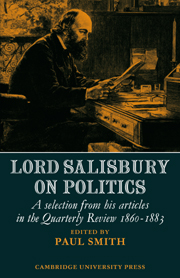Book contents
- Frontmatter
- Contents
- Preface
- List of abbreviations
- Editor's introduction
- Bibliographical note
- ‘The Budget and the Reform Bill’ (April 1860)
- ‘The House of Commons’ (July 1864)
- ‘The Reform Bill’ (April 1866)
- ‘The Change of Ministry’ (July 1866)
- ‘The Conservative Surrender’ (October 1867)
- ‘The Programme of the Radicals’ (October 1873)
- ‘Disintegration’ (October 1883)
- Index
- Cambridge Studies in the History and Theory of Politics
‘Disintegration’ (October 1883)
Published online by Cambridge University Press: 06 July 2010
- Frontmatter
- Contents
- Preface
- List of abbreviations
- Editor's introduction
- Bibliographical note
- ‘The Budget and the Reform Bill’ (April 1860)
- ‘The House of Commons’ (July 1864)
- ‘The Reform Bill’ (April 1866)
- ‘The Change of Ministry’ (July 1866)
- ‘The Conservative Surrender’ (October 1867)
- ‘The Programme of the Radicals’ (October 1873)
- ‘Disintegration’ (October 1883)
- Index
- Cambridge Studies in the History and Theory of Politics
Summary
INTRODUCTORY NOTE
To pass from ‘The Programme of the Radicals’ to Salisbury's last Quarterly article is to experience only a limited sense of transition, for, as the author himself noted, there was much in 1883 to recall the circumstances often years or so earlier. The Disraeli ministry of 1874–80 had come and gone, destroyed by economic depression and Gladstone's thunderings against its foreign and imperial policies. The Liberals were again in power with a large majority, but again beset by multiplying difficulties, and by deepening internal dissensions resulting from the pressure of their Radical wing under Chamberlain's lead. Chamberlain was in the cabinet now, together with Dilke, and Salisbury was leader of the Conservative party, in tandem with Sir Stafford Northcote.
The government had met trouble from the start. The first session of Parliament saw the beginnng of the protracted and discreditable struggle over Bradlaugh's right to take the oath. Then imperial problems built up: righting in Afghanistan was succeeded by the rising of the Boers in the Transvaal, ending in 1881 in the independence of the province under British suzerainty, and in 1882 came the reluctant intervention in Egypt, from which it was subsequently to prove impossible to withdraw. But above all else stood the Irish question, now assuming a central place in British politics. The agricultural depression of the late seventies had hit the Irish tenant farmers severely: thousands had got into arrears with their rents, and the level of evictions had risen sharply.
- Type
- Chapter
- Information
- Lord Salisbury on PoliticsA selection from his articles in the Quarterly Review, 1860-1883, pp. 335 - 376Publisher: Cambridge University PressPrint publication year: 1972



